最新一般现在时讲解及练习
- 格式:doc
- 大小:86.00 KB
- 文档页数:10
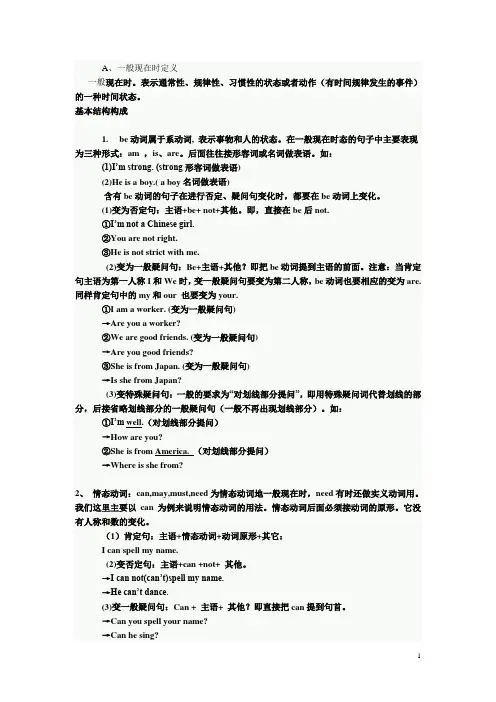
A、一般现在时定义一般现在时。
表示通常性、规律性、习惯性的状态或者动作(有时间规律发生的事件)的一种时间状态。
基本结构构成1. be动词属于系动词, 表示事物和人的状态。
在一般现在时态的句子中主要表现为三种形式:am ,is、are。
后面往往接形容词或名词做表语。
如:(1)I’m strong. (strong形容词做表语)(2)He is a boy.( a boy名词做表语)含有be动词的句子在进行否定、疑问句变化时,都要在be动词上变化。
(1)变为否定句:主语+be+ not+其他。
即,直接在be后not.①I’m not a Chinese girl.②You are not right.③He is not strict with me.(2)变为一般疑问句:Be+主语+其他?即把be动词提到主语的前面。
注意:当肯定句主语为第一人称I和We时,变一般疑问句要变为第二人称,be动词也要相应的变为are.同样肯定句中的my和our 也要变为your.①I am a worker. (变为一般疑问句)→Are you a worker?②We are good friends. (变为一般疑问句)→Are you good friends?③She is from Japan. (变为一般疑问句)→Is she from Japan?(3)变特殊疑问句:一般的要求为“对划线部分提问”,即用特殊疑问词代替划线的部分,后接省略划线部分的一般疑问句(一般不再出现划线部分)。
如:①I’m well.(对划线部分提问)→How are you?②She is from America. (对划线部分提问)→Where is she from?2、情态动词:can,may,must,need为情态动词地一般现在时,need有时还做实义动词用。
我们这里主要以can为例来说明情态动词的用法。
情态动词后面必须接动词的原形。
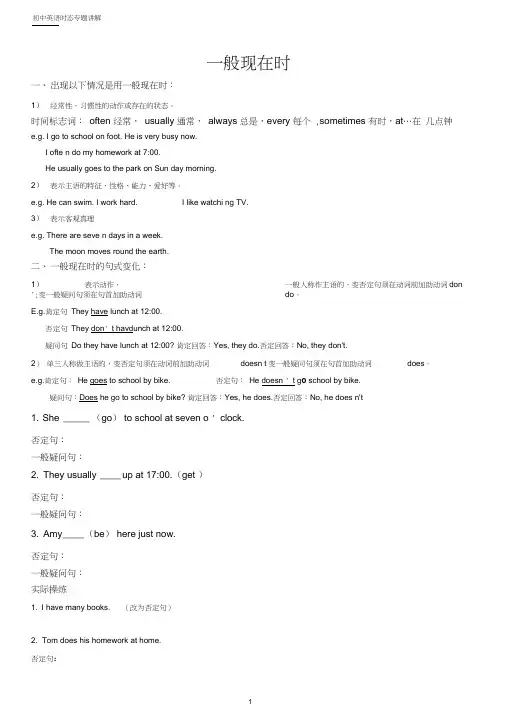
一般现在时一、出现以下情况是用一般现在时:1)经常性、习惯性的动作或存在的状态。
时间标志词:often 经常,usually 通常,always 总是,every 每个 ,sometimes 有时,at…在几点钟e.g. I go to school on foot. He is very busy now.I ofte n do my homework at 7:00.He usually goes to the park on Sun day morning.2)表示主语的特征、性格、能力、爱好等。
e.g. He can swim. I work hard. I like watchi ng TV.3)表示客观真理e.g. There are seve n days in a week.The moon moves round the earth.二、一般现在时的句式变化:1)表示动作,一般人称作主语的,变否定句须在动词前加助动词don ';变一般疑问句须在句首加助动词do。
E.g.肯定句They have lunch at 12:00.否定句They don' t havdunch at 12:00.疑问句Do they have lunch at 12:00? 肯定回答:Yes, they do.否定回答:No, they don't.2)单三人称做主语的,变否定句须在动词前加助动词doesn t变一般疑问句须在句首加助动词does。
e.g.肯定句:He goes to school by bike. 否定句:He doesn ' t g o school by bike.疑问句:Does he go to school by bike? 肯定回答:Yes, he does.否定回答:No, he does n't1. She _____ (go) to school at seven o ' clock.否定句:一般疑问句:2. They usually ____ up at 17:00.(get )否定句:一般疑问句:3. Amy ____ (be) here just now.否定句:一般疑问句:实际操练1. I have many books. (改为否定句)2. Tom does his homework at home.否定句:一般疑问句:3. Mingming usually waters the flowers.否定句: 一般疑问句4.Su Yang usually washes some clothes on Saturday.否定句:5. I usually play football on Friday after noon.否定句: 般疑问句:( )1. _____ you have a book? A. DoB. AreC. IsD. Have( )2. They ________ on a farm. A.are worki ngB. is workC. worki ngD. is worked()3. Does Peter like to watch TV? _________ .( )6. Where ' s my camera? I _____________ it.强化训练一、写出下列单词的第三人称单数形式clean _________ write ___________ guess _________ watch ___________cry _________ play ______________A. Yes, he likeB. No, he doe sn 'tC. Yes, he ' d likeD. No, he likes ()4. She doesn ' t her homework in the after noon. A. doing B. to do C. does D. do()5. HowMr. Brow n __________ to America?A. do, goB. is, goC. does, go1. My classmate ____ (know) the man on the bike.2. His sister usually _____ (go) to school at 7:00 am.C. can ' t find D. can ' t look at( )7. How he go to work? HeA. does; goB. do; goesC. do ; go ( )8.you usually late for school? No,A . Do; I am B. Does ;not( )9.she home at six every day?A . Is , leave B. Does ,leave( )10. Mr. Yang En glish this term.A . teaches our B. teaches usto work by bike.D.does; goesC. Are ; I ' m notD. Are ; I aren 'tC. Is , leavesD. Does , leftC. teachs usD. teach ourA. am not findingB. am not see ing 三•用所给动词的适当形式填空。
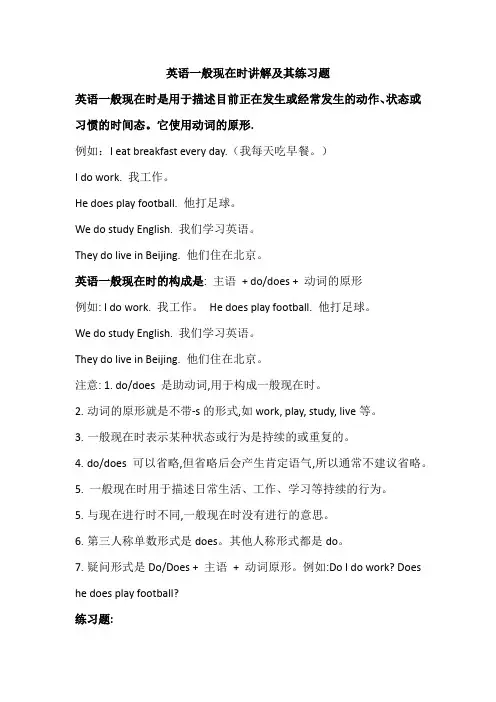
英语一般现在时讲解及其练习题英语一般现在时是用于描述目前正在发生或经常发生的动作、状态或习惯的时间态。
它使用动词的原形.例如:I eat breakfast every day.(我每天吃早餐。
)I do work. 我工作。
He does play football. 他打足球。
We do study English. 我们学习英语。
They do live in Beijing. 他们住在北京。
英语一般现在时的构成是: 主语+ do/does + 动词的原形例如: I do work. 我工作。
He does play football. 他打足球。
We do study English. 我们学习英语。
They do live in Beijing. 他们住在北京。
注意: 1. do/does 是助动词,用于构成一般现在时。
2.动词的原形就是不带-s的形式,如work, play, study, live等。
3.一般现在时表示某种状态或行为是持续的或重复的。
4.do/does 可以省略,但省略后会产生肯定语气,所以通常不建议省略。
5. 一般现在时用于描述日常生活、工作、学习等持续的行为。
5.与现在进行时不同,一般现在时没有进行的意思。
6.第三人称单数形式是does。
其他人称形式都是do。
7.疑问形式是Do/Does + 主语+ 动词原形。
例如:Do I do work? Does he does play football?练习题:一.请改正下列句子中的语法错误并将其变为一般现在时:1.She always drink tea in the morning. -She always drinks tea in the morning.2.They don't likes to eat spicy food. - They don't like to eat spicy food.3.He go to school by bus every day. - He goes to school by bus every day.4. I usually listen music while I work. -I usually listen to music while I work.5.We doesn't have any plans for tonight. - We don't have any plans for tonight.二.请改正下列句子中的语法错误并将其变为一般现在时:1. She always drink tea in the morning. -She always drinks tea in the morning.2. They don't likes to eat spicy food. - They don't like to eat spicy food.3. He go to school by bus every day. - He goes to school by bus every day.4. I usually listen music while I work. -I usually listen to music while I work.5. We doesn't have any plans for tonight. - We don't have any plans for tonight.三.用动词正确的形式填空:1. She ___________ (watch) TV every evening. Answer: watches2. They ___________ (play) basketball on Saturdays. Answer: play3. He usually ___________ (get up) at 6 o'clock in the morning. Answer:gets up4. My sister and I ___________ (like) to read books before bed. Answer: like5. The sun ___________ (rise) in the east and sets in the west. Answer: rises6. We always ___________ (have) lunch at noon. Answer: have7. Tom often _________(go )to the gym after work Answer : goes8 .My mother _________(cook )delicious meals for us Answer : cooks9.He __________ (play) basketball every weekend. Answer: plays10.The cat __________ (run) after the mouse. Answer: runs11. She usually __________ (eat) breakfast at 7 o'clock. Answer: eats12. My sister always __________ (drink) coffee in the morning. Answer: drinks13. Tom often __________ (study) English for two hours every day. Answer: studies四. 请改正下面每个句子的错误,并将其改写成一般现在时。
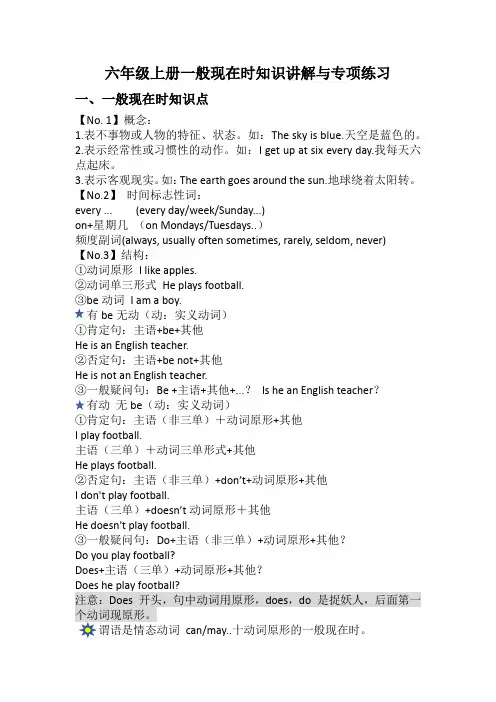
六年级上册一般现在时知识讲解与专项练习一、一般现在时知识点【No. 1】概念:1.表不事物或人物的特征、状态。
如:The sky is blue.天空是蓝色的。
2.表示经常性或习惯性的动作。
如:I get up at six every day.我每天六点起床。
3.表示客观现实。
如:The earth goes around the sun.地球绕着太阳转。
【No.2】时间标志性词:every ... (every day/week/Sunday...)on+星期几(on Mondays/Tuesdays..)频度副词(always, usually often sometimes, rarely, seldom, never)【No.3】结构:①动词原形I like apples.②动词单三形式He plays football.③be动词I am a boy.有be无动(动:实义动词)①肯定句:主语+be+其他He is an English teacher.②否定句:主语+be not+其他He is not an English teacher.③一般疑问句:Be +主语+其他+...?Is he an English teacher?有动无be(动:实义动词)①肯定句:主语(非三单)+动词原形+其他I play football.主语(三单)+动词三单形式+其他He plays football.②否定句:主语(非三单)+don’t+动词原形+其他I don't play football.主语(三单)+doesn’t动词原形+其他He doesn't play football.③一般疑问句:Do+主语(非三单)+动词原形+其他?Do you play football?Does+主语(三单)+动词原形+其他?①肯定形式:主语十情态动词can/may+动词原形+宾语。
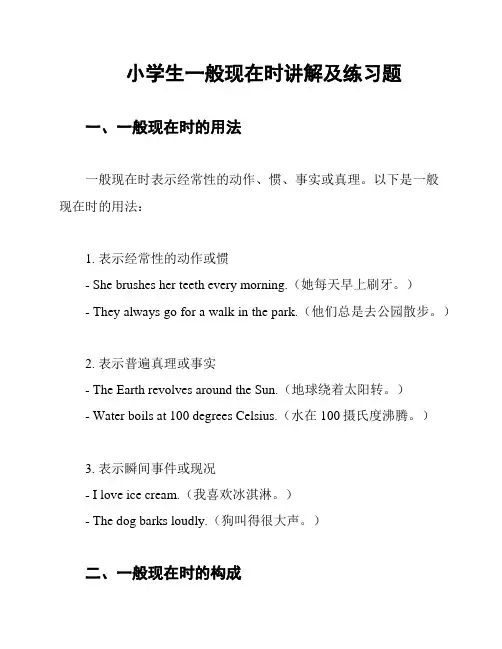
小学生一般现在时讲解及练习题一、一般现在时的用法一般现在时表示经常性的动作、惯、事实或真理。
以下是一般现在时的用法:1. 表示经常性的动作或惯- She brushes her teeth every morning.(她每天早上刷牙。
)- They always go for a walk in the park.(他们总是去公园散步。
)2. 表示普遍真理或事实- The Earth revolves around the Sun.(地球绕着太阳转。
)- Water boils at 100 degrees Celsius.(水在100摄氏度沸腾。
)3. 表示瞬间事件或现况- I love ice cream.(我喜欢冰淇淋。
)- The dog barks loudly.(狗叫得很大声。
)二、一般现在时的构成在一般现在时中,动词的变化相对简单。
1. 对于第三人称单数(He/She/It),动词要加-s或-es。
- He walks to school every day.(他每天走路去学校。
)- She eats an apple.(她吃一个苹果。
)- It runs fast.(它跑得很快。
)2. 对于其他人称(I/You/We/They),动词不变。
- I play soccer on weekends.(我周末踢足球。
)- You read books every night.(你每晚读书。
)- We go swimming in summer.(我们夏天去游泳。
)- They watch movies together.(他们一起看电影。
)三、练题请根据句意填入正确的动词形式。
1. My mother __________ (cook) dinner for us every evening.2. Tom and Lisa __________ (play) tennis on Saturdays.3. The sun __________ (rise) in the east.4. We __________ (study) English at school.5. Dogs __________ (bark) when they see strangers.1. cooks2. play3. rises4. study5. bark希望以上讲解和练习题对你有帮助!。
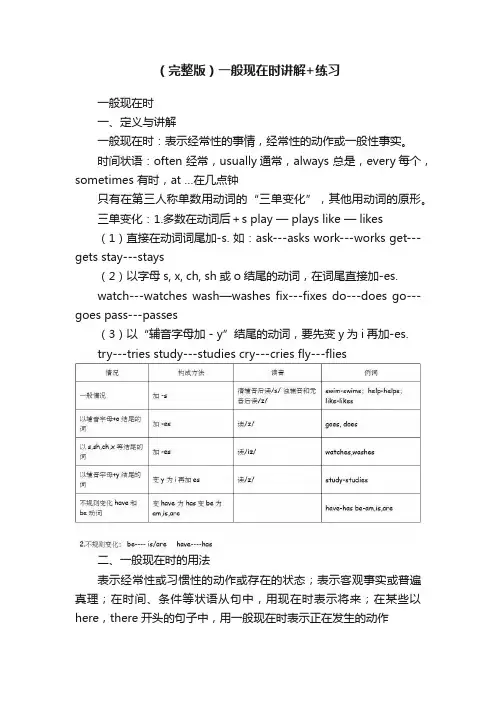
(完整版)一般现在时讲解+练习一般现在时一、定义与讲解一般现在时:表示经常性的事情,经常性的动作或一般性事实。
时间状语:often 经常,usually通常,always 总是,every每个,sometimes 有时,at …在几点钟只有在第三人称单数用动词的“三单变化”,其他用动词的原形。
三单变化:1.多数在动词后+s play — plays like — likes(1)直接在动词词尾加-s. 如:ask---asks work---works get---gets stay---stays(2)以字母s, x, ch, sh或o结尾的动词,在词尾直接加-es.watch---watches wash—washes fix---fixes do---does go---goes pass---passes(3)以“辅音字母加 - y”结尾的动词,要先变y为i再加-es.try---tries study---studies cry---cries fly---flies二、一般现在时的用法表示经常性或习惯性的动作或存在的状态;表示客观事实或普遍真理;在时间、条件等状语从句中,用现在时表示将来;在某些以here,there开头的句子中,用一般现在时表示正在发生的动作当主语是第三人称单数时:1、动词变相应的第三人称单数形式2、肯定句主语+动词s+其它3、否定句主语+doesn't+动词原形+其它4、一般疑问句Does+主语+动词原形+其它5、肯定回答 Yes,主语+does6、否定回答 No,主语+doesn't7、特殊疑问句特殊疑问词+一般疑问句当主语不是第三人称单数时:1、肯定句主语+动词原形+其它2、否定句主语+don't+动词原形+其它3、一般疑问句 Do+主语+动词原形+其它4、要注意,句式结构错则全都错。
5、谓语动词的形式:do/does一般现在时练习一、用所给词的正确形式填空1. We often ___________ (play) on the playground.2. He _________ (get) up at six o’clock.3. __________you _________ (brush) your teeth every morning.4. What____ (do) he usually _____ (do) after school?5. Danny _______ (study) English, Chinese, Math, Science and Art at school.6. Mike sometimes __________ (go) to the park with his sister.7. At eight at night, she ________ (watch) TV with his parents.8. ________ Mike________ (read) English every day?9. How many lessons ______your classmate____ (have) on Monday?10. What time ____his mother_________ (do) the housework?11. He often ______ (have) dinner at home. 12. Daniel and Tommy___ (be) in Class One. 13. We____ (not watch) TV on Monday. 14. Nick _____(not go) to the zoo on Sunday.15. They______ (like) the World Cup? 16. What ____they often ____ (do) on Saturdays17. Your parents________ (read) newspapers every day?18. The girl______ (teach) us English on Sundays.19. She and I _______ (take) a walk together every evening.20. There_______ (be) some water in the bottle. 21. Mike ______ (like) cooking.22. They_______ (have) the same hobby. 23. My aunt______ (look) after her baby carefully.24. You always____ (do) your homework well. 25. I_____ (be) ill. I’m sta ying in bed.26. She_____ (go) to school from Monday to Friday. 27. Liu Tao _____ (do) not like PE.28. The child often______ (watch) TV in the evening.29. Su Hai and Su Yang ______(have) eight lessons this term.30. -What day ______(be) it today? -It’s Saturday.31. Don’t make a noise. Grandpa __________ (sleep).32. Tom’s family__________ (watch) TV.33. It ________ (take) me two hours to finish my homework last night.34. What ______ your mother _______ (do) every evening? She_______ (wash) clothes.35. _______ it ______ (rain) every day?36. What _______ (do) you _______ on Sundays? We ________ (play) football.37. There ________ (be) a football match on TV every morning.38. They often ________ (visit) the Great Wall.39. Who _______ (dance) the best in your class?40. He _____________ (not come).41. The earth __________ (move) round the sun.42 She ________ (buy) a sweater.43. Mr. Wang often______ (go) to Shanghai.二、改句子1. Do you often play football after school? (肯定回答)_______________________________2. I have many books. (改为否定句)_______________________________3. Gao Shan's sister likes playing table tennis (改为否定句)________________________4. She lives in a small town near New York. (改为一般疑问句)________________________5. I watch TV every day. (改为一般疑问句)________________________6. David has a goal. (改为一般疑问句)________________________7. We have four lessons.(否定句)________________________8. Nancy doesn’t run fast (肯定句)________________________9. My dog runs fast. (一般疑问句) ________________________(把10—14小题变否定句,一般疑问句和划线提问)10. Mike has two letters for him. ________________________11. I usually play football on Friday afternoon.________________________12. Su Yang usually washes some clothes on Saturday. ________________________13. Mingming usually waters the flowers every day. ________________________14. Tom does his homework at home. ________________________三、写出下列动词的第三人称单数形式:1. wash_________ match _______ guess______ study______finish_________ go________ snow______ carry_________2. stop______ see________ drive ________let_______ carry______keep_____ join______ find_______ think________ teach______ catch______3. stay_______ begin______ forget_______ lie________ die _______run_______ prefer______ give________ ring_______ dance______ hope_______四、单项选择:1. There _____ an English film at the cinema now.A. will haveB. is going to haveC. is going to beD. is2. The picture _______ nice. A. looks B. is looked C. look D. is looking3. She ______ down and soon falls asleep. A. live B. lain C. laidD. sits4. They _____ the office in time very morning. A. reach to B. arrived C. went D. get to5. We shall go to Shanghai on business before you _____ back next week.A. will comeB. cameC. would comeD. come6. The plane ______ over there. A. is B. are C.am D. was7. I see her ____ the room this morning. A. to enter B. enteredC. enterD. enters8. The teacher ________us to come to school on time. A. ask B. asking C. asks D. asked9. John always ______ others. A. help B. helping C. helps D. to help10. He ______for eight hours every day. A. working B. to workC. worksD. worked11. You’d better ______ at home and ______ your homework.A. to stay, doB. stay, doC. to stay, to doD. stay, to do12. He sits down and ______ a rest. A. having B. have C. to haveD. has13. Uncle Wang never ______ a cake. A. make B. to make C. making D. makes五、请写出下列句子1.他每天早上七点乘公交车去上学。
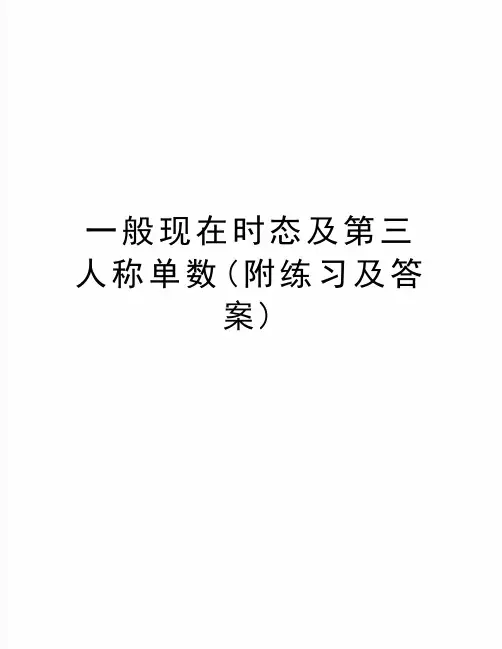
一般现在时态及第三人称单数(附练习及答案)一般现在时态及第三人称单数(附练习及答案)第三人称单数问题一般现在时中,当主语是第三人称单数时,即常在动词原形后加-s或-es。
第三人称单数变化,现归纳总结如下:1.人称代词he, she, it是第三人称单数。
如:He likes watching TV.他喜欢看电视。
She has lunch at twelve.她十二点吃午餐。
It looks like a cat.它看起来像只猫。
2.单个人名、地名或称呼作主语;用第三人称单数。
如:①Han Mei looks like her mother.韩梅看起来像她的母亲。
②Beijing is in China.北京在中国。
③Uncle Wang often makes cakes.王叔叔经常做蛋糕。
3.单数可数名词或"this / that / the/ a +单数可数名词"作主语时,是第三人称单数。
如:①A horse is a useful animal.马是有用的动物。
②This book is yours.这本书是你的。
③That car is red.那辆小汽车是红色的。
④The cat is Lucy's.这只猫是露茜的。
4.不定代词someone, somebody, nobody, everything, something等及指示代词this, that作主语时,第三人称单数。
①Everyone is here.大家到齐了。
②There is something wrong with the watch.这块手表有毛病。
③This is a pen.这是一支钢笔。
④That is an eraser.那是一块橡皮擦。
5.不可数名词作主语时为第三人称单数。
如:①The milk is in the glass. ②The bread is very small.6.当数字或字母作主语时,看作第三人称单数。
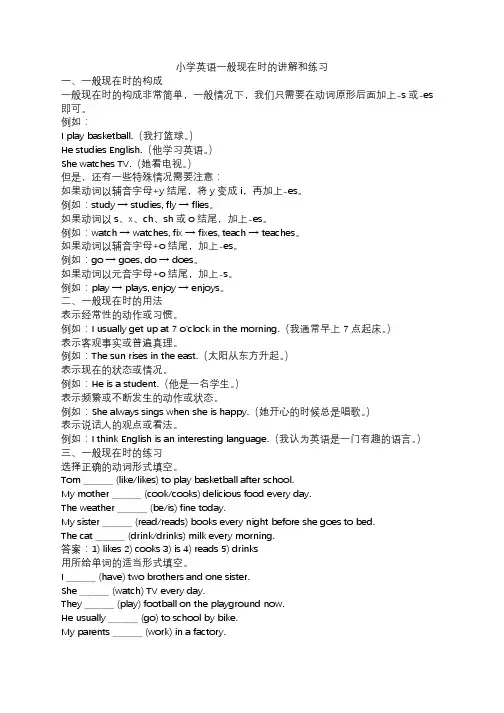
小学英语一般现在时的讲解和练习一、一般现在时的构成一般现在时的构成非常简单,一般情况下,我们只需要在动词原形后面加上-s或-es 即可。
例如:I play basketball.(我打篮球。
)He studies English.(他学习英语。
)She watches TV.(她看电视。
)但是,还有一些特殊情况需要注意:如果动词以辅音字母+y结尾,将y变成i,再加上-es。
例如:study → studies, fly → flies。
如果动词以s、x、ch、sh或o结尾,加上-es。
例如:watch → watches, fix → fixes, teach → teaches。
如果动词以辅音字母+o结尾,加上-es。
例如:go → goes, do → does。
如果动词以元音字母+o结尾,加上-s。
例如:play → plays, enjoy → enjoys。
二、一般现在时的用法表示经常性的动作或习惯。
例如:I usually get up at 7 o'clock in the morning.(我通常早上7点起床。
)表示客观事实或普遍真理。
例如:The sun rises in the east.(太阳从东方升起。
)表示现在的状态或情况。
例如:He is a student.(他是一名学生。
)表示频繁或不断发生的动作或状态。
例如:She always sings when she is happy.(她开心的时候总是唱歌。
)表示说话人的观点或看法。
例如:I think English is an interesting language.(我认为英语是一门有趣的语言。
)三、一般现在时的练习选择正确的动词形式填空。
Tom _______ (like/likes) to play basketball after school.My mother _______ (cook/cooks) delicious food every day.The weather _______ (be/is) fine today.My sister _______ (read/reads) books every night before she goes to bed.The cat _______ (drink/drinks) milk every morning.答案:1) likes 2) cooks 3) is 4) reads 5) drinks用所给单词的适当形式填空。
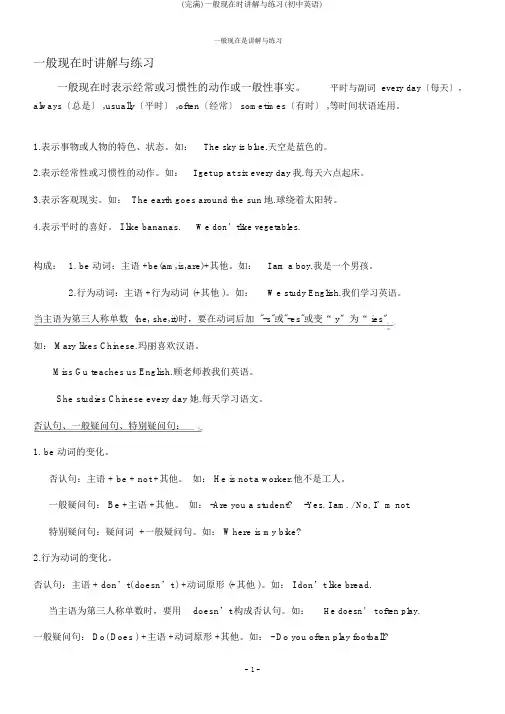
一般现在是讲解与练习一般现在时讲解与练习一般现在时表示经常或习惯性的动作或一般性事实。
平时与副词 every day〔每天〕,always〔总是〕 ,usually〔平时〕 ,often〔经常〕 sometimes〔有时〕 ,等时间状语连用。
1.表示事物或人物的特色、状态。
如:The sky is blue.天空是蓝色的。
2.表示经常性或习惯性的动作。
如:I get up at six every day我.每天六点起床。
3.表示客观现实。
如: The earth goes around the sun地.球绕着太阳转。
4.表示平时的喜好。
I like bananas.We don’tlike vegetables.构成: 1. be 动词:主语 +be(am,is,are)+其他。
如:I am a boy.我是一个男孩。
2.行为动词:主语 +行为动词 (+其他 )。
如:We study English.我们学习英语。
当主语为第三人称单数 (he, she,it)时,要在动词后加 "-s"或"-es"或变“ y〞为“ ies〞如: Mary likes Chinese.玛丽喜欢汉语。
Miss Gu teaches us English.顾老师教我们英语。
She studies Chinese every day她.每天学习语文。
否认句、一般疑问句、特别疑问句:1. be 动词的变化。
否认句:主语 + be + not +其他。
如: He is not a worker.他不是工人。
一般疑问句: Be +主语 +其他。
如: -Are you a student?-Yes. I am. / No, I’m not.特别疑问句:疑问词 +一般疑问句。
如: Where is my bike?2.行为动词的变化。
否认句:主语 + don’t( doesn’t ) +动词原形 (+其他 )。
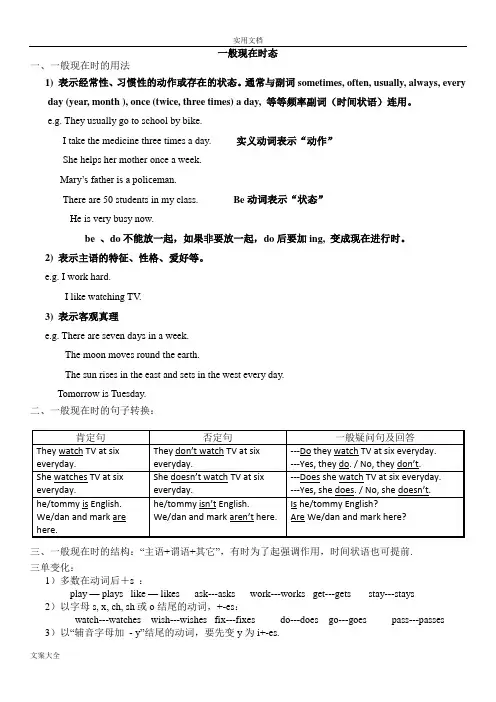
一般现在时态一、一般现在时的用法1) 表示经常性、习惯性的动作或存在的状态。
通常与副词sometimes, often, usually, always, everyday (year, month ), once (twice, three times) a day, 等等频率副词(时间状语)连用。
e.g. They usually go to school by bike.I take the medicine three times a day. 实义动词表示“动作”She helps her mother once a week.Mary’s father is a policeman.There are 50 students in my class. Be动词表示“状态”He is very busy now.be 、do不能放一起,如果非要放一起,do后要加ing, 变成现在进行时。
2) 表示主语的特征、性格、爱好等。
e.g. I work hard.I like watching TV.3) 表示客观真理e.g. There are seven days in a week.The moon moves round the earth.The sun rises in the east and sets in the west every day.Tomorrow is Tuesday.二、一般现在时的句子转换:三、一般现在时的结构:“主语+谓语+其它”,有时为了起强调作用,时间状语也可提前.三单变化:1)多数在动词后+s :play — plays like — likes ask---asks work---works get---gets stay---stays 2)以字母s, x, ch, sh或o结尾的动词,+-es:watch---watches wish---wishes fix---fixes do---does go---goes pass---passes 3)以“辅音字母加- y”结尾的动词,要先变y为i+-es.try---tries study---studies cry---cries fly---flies不规则变化:be---- is are have----has做题时常见错误如下:1)、be动词与行为动词同时出现在句子中例:We are plant (plant) the trees in spring.答案:plant2)、单三人称形式易出错例:1 He plaies (play) football very well.2 Danny gos (go) to school at 7:10.答案:1 plays 2 goes解析:1以辅音字母加y结尾的动词变单三人称形式才能把y换成i再加es;2与名词变复数不同,变单三人称形式以o结尾的词要加es.3)、在句式变换时易出错例:1 Does Jenny has (has) a good friend?2 Brian doesn’t lives (not live) in China.答案:1 Does have 2 doesn’t live解析:口诀:“见助动,用原形”。
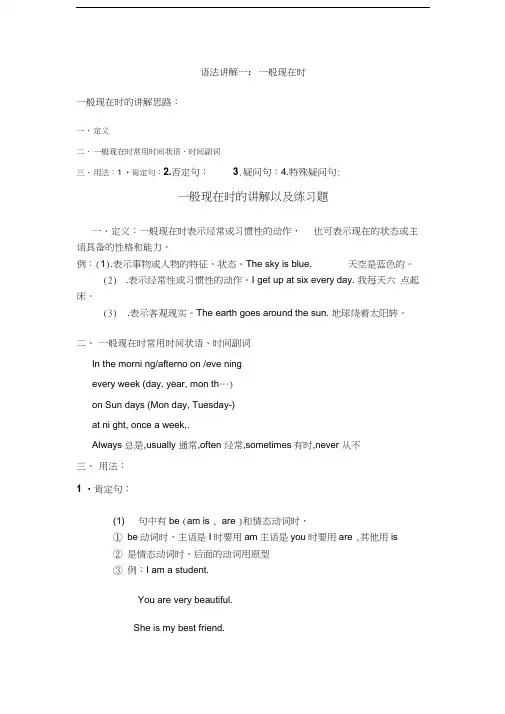
语法讲解一:一般现在时一般现在时的讲解思路:一、定义二、一般现在时常用时间状语、时间副词三、用法:1 •肯定句:2.否定句:3.疑问句:4.特殊疑问句:一般现在时的讲解以及练习题一、定义:一般现在时表示经常或习惯性的动作,也可表示现在的状态或主语具备的性格和能力。
例:(1).表示事物或人物的特征、状态。
The sky is blue. 天空是蓝色的。
(2).表示经常性或习惯性的动作。
I get up at six every day. 我每天六点起床。
(3).表示客观现实。
The earth goes around the sun. 地球绕着太阳转。
二、一般现在时常用时间状语、时间副词In the morni ng/afterno on /eve ningevery week (day, year, mon th…)on Sun days (Mon day, Tuesday-)at ni ght, once a week,.Always 总是,usually 通常,often 经常,sometimes有时,never 从不三、用法:1 •肯定句:(1) 句中有be (am is , are )和情态动词时,①be动词时,主语是I时要用am主语是you时要用are ,其他用is②是情态动词时,后面的动词用原型③例:I am a student.You are very beautiful.She is my best friend.He can do his homework by himself(2)没有be (am is, are )动词和情态动词:主语为第三人称单数(she ,he ,it )、单数可数名词、不可数名词的,动词要按规则加上s或es;主语是复数可数名词的肯定句,动词用原形。
例:①She(He, It )likes fish. 她(他,它)喜欢鱼。
(主语为第三人称单数②The table has four legs.桌子有四条腿。
一般现在时Present Tense一、概念:表示通常性、规律性、习惯性的状态或者动作(有时间规律发生的事件)的一种时间状态。
拆开来讲就是:时间:指动作发生在“现在”的时间段内。
那么,多长的时间才叫“现在”呢?一天?状态:一般现在时最容易迷惑的一个问题,就是拿不准什么叫“经常发生的动作或存在的状态”?这个问题要分三层来讲:1.“经常发生的动作”,比如每天起床、吃饭、上学,一个星期去几次超市或新华书店等。
这些事件中,有的是有规律的,有的是偶尔做几次。
这些都算经常发生的事件。
我们要告诉人们的,是这个动作经常发生,是一般的情况而不是具体的某一次。
2.事物存在的状态。
3.有些动作或状态是永恒的,比如长江向东流、地球绕着太阳转,比如谚语中举的事例、文学作品中描绘的事例,像“好马不吃回头草”等等二、基本用法:1.表示经常性或习惯性发生的动作。
如:I always get up at 7 o’clock in the morning.我总是在早上7点起床。
We often read books at school.我们在学校经常看书。
They usually have dinner at 6:00 in the evening.他们通常在晚上6点吃晚餐。
2.表示现在的状态或特征。
如:She loves English very much.她非常爱英语。
We are always at home on weekends.周末我们总留在家。
Tom is an exellent player.汤姆是一位优秀的运动员。
3.表示客观的现实。
如:The sun rises in the east.太阳从东方升起。
Summer comes after spring.夏天在春天的后面4.用在按计划、规定或安排发生的事情。
如:The plane leaves at 9:30.飞机9点30分起飞。
Tomorrow is Sunday.明天是星期天。
一般现在时讲解及练习(含答案)一、单项选择一般现在时1.If he ________ exercise, he______ healthy.A.not; will B.isn’t; won’t beC.doesn’t; will be D.doesn’t do; won’t be【答案】D【解析】【详解】考查if条件句中的时态。
句意:如果他不做运动,他就不会健康。
If条件句,如果主句用一般将来时态,则从句用一般现在时态,且句子主语是he,单数第三人称,故选D。
2.Whene ver you ______ a present, you’d better think about it from the receiver’s preference. A.bought B.buy C.will buy D.have bought【答案】B【解析】试题分析:句意:每当你买礼物的时候,你最好从接收方的偏好想一想。
whenever引导的让步状语从句,采用一般现在时表将来的用法。
故选B。
考点:考查动词的时态。
3.The Dragon Boat Festival ________ the beginning of the hottest season of the year.A.is marking B.marks C.will mark D.marked【答案】B【解析】试题分析:考查时态。
一般现在时表示经常性习惯性的行为。
本句中使用一般现在时端午节标志着一年中最热的季节的开始。
故B正确。
考点:考查时态4.That’s why I help brighten people’s days. If you ________, who’s to say that anothe r person will?A.didn’t B.don’tC.weren’t D.haven’t【答案】B【解析】【详解】考查条件状语从句中动词的时态。
一、一般现在时态1、一般现在时态的概念(1)、表示现在的状态(谓语多用系动词be)(2)、表示经常或习惯性的动作(谓语是do类动词)(3)、表示主语具备的性格和能力(谓语多是speak like enjoy)2、be (am is are)“是”,英语中最重要的一个系动词。
do类动词,又叫实义动词。
例如:have (有),play(玩,打)等。
3、一般现在时态的动词形式一般现在时态规定:系动词be用现在式am is are 三个形式。
do 类动词用原型或第三人称单数形式。
“原形动词+ s / es”构成“第三人称单数形式”,与单数名词变复数名词方法一样。
(1)、一般情况,动词后直接加s例如:brings 带来calls 打电话meets 遇见needs 需要(2)、以字母e结尾的动词,直接加s (读/ z /)例如:Likes 喜欢takes 带走(3)、以字母s x ch sh o结尾的动词,加es例如:does 做goes 走,去watches 观看(4)、以“辅音字母+ y”结尾的名词,变y为i,加es例如:stud y →studies 学习(思考:enjoy play have的第三人称单数形式是)4 、一般现在时态主语与谓语动词的搭配第一人称单数主语:I +am 或V原形he she itthis that第三人称单数主语单数名词不可数名词+ is ; V单三形式动词不定式动名词We you they复数主语these those + are ; V原形复数名词本块习题:用所给词的正确形式填空1、I _______ ( have ) a soccer ball .2、She ______ ( have ) two __________ ( pingpong—ball ) .3、He ______ ( play ) sports every day .4、We ______ ( speak ) English .5、Tom ______ ( call ) Jim every day .6、My daughter ______ ( like ) apples .7、His ______ ( friend ) knows English .8、The girl ______ ( study ) English sometimes .9、The _______ ( boy ) often watch TV .10、Her uncle ______ ( go ) home on foot 。
一般现在时定义:表示经常、反复发生的动作,经常存在的状态或者习惯性动作(有时间规律发生的事情)的一种时间状态。
(很拗口,但要学会就必须深刻体会,so please 将其狂读3遍)具体用法1、表示经常的或习惯性的动作,常与表示频率的时间状语连用。
(always, usually, often,sometimes, every day\ morning\ night\ evening\afternoon\week,)e.g. I go to school at 8:00 every morning.2 表示主语具备的性格、能力、特征和状态及喜好等。
e.g She is 11 years old .I don’t like English.She can speak English well.3表示客观事实和普遍真理。
e.g The earth moves around the sun.基本结构构成含有be(am、is 、are)动词的用法肯定句:I am+其它.You \ they\ we are +其它.She \he \ it+is +其它.否定句:I am not+ 其它.You \ they\ we are not +其它.She \he \ it+is +not +其它.一般疑问句及回答:Are you +其它?肯定回答:Yes, I am. 否定回答:No, I am not.Are you\ they\ you+ 其它?肯定回答:Yes,we \they are. 否定回答:No, we \they aren’t.Is she\ he \it+其它?肯定回答: Yes,she \he \it is. 否定回答:No,she \he \it isn’t.从上面结构中你能总结出be动词的用法吗?单数________,复数_________ ;我用_________,你用__________ ,______________-连着她他它。
最新一般现在时讲解及练习一、单项选择一般现在时1.I want to buy that kind of cloth because I ______ the cloth ______ well.A.have told;washes B.have been told;washesC.was told;washed D.have been told;is washed【答案】B【解析】【详解】考查语态时态。
句意:因为我已经被告知这种布料很好洗,于是我想去买这种布。
第一空中使用现在完成时表示过去发生的事情对现在的影响,且I与tell是被动关系,所以使用现在完成时的被动形式。
第二空中动词wash与副词well连用,用主动形式表示被动含义。
故B项正确。
【点睛】小题2中考查了主动表示被动的用法,涉及“主语+不及物动词+主语补语”句型中的一些不及物动词使用主动表示被动的用法。
具体用法如下:1)系动词没有被动形式,但有些系动词常表示被动意义。
常见的有taste(吃起来), sound (听起来), prove(证明是), feel(摸上去感到)等,例如:Your reason sounds reasonable. 你的理由听起来很合理。
Good medicine tastes bitter to the mouth. 良药苦口。
2)一些与can't(不能)或won't(不会)连用的动词。
常用的有: lock(锁住), shut(关上) , open (打开,营业), close(关门), cut(切割), weigh(重), act(上演),例如:The door won't open. 这门打不开。
It can't move. 它不能动。
This shop opens much earlier than it used to. Each stone weighs 2 tons.3)一些与well(很), easily(容易地), perfectly(十分地)等连用的动词,如: sell, wash, clean, burn, cook, wash, write, last, read, wear等。
这种“动词+副词”结构,常表示事物内部特有的属性。
例如:The book sells well. 这种书很畅销。
These clothes wash well. 这些衣服很耐洗。
4) 用在“主语+不及物动词+主语补语”句型中的一些不及物动词,例如:This material has worn thin.这料子已磨薄了。
The dust has blown into the house.灰尘被风吹进了房子。
This kind of cloth washes well and lasts long.The pen my father gave me as a birthday gift writes smoothly.Written in simple English, this article reads easily.5) 某些不及物动词,如happen, occur, cost以及短语,如come out(出版), come up (出现), come into being(产生)come to one’s mind(想起), turn out(证明是), come about(发生), break out(爆发), belong to(属于)等,本身表被动含义,所以它们常用主动形式。
The first textbooks written for teaching English as a foreign language came out in the18th century.Suddenly an idea came to his mind. It never occurred to me to phone you.2.The doctor suggested that I keep away from oily food, because it ________ easily.A.isn’t digest B.doesn’t digestC.isn’t to digest D.won’t be digested【答案】B【解析】试题分析:考查时态和语态。
句意:医生建议我远离多油的食品,因为它不容易消化。
此处是主动表示被动,说明主语的特性或存在的状态,用一般现在时态,通常是sell/open等不及物动词和well/easily连用。
故选B。
【学法指导】英语中有些动词在形式上是主动的,含义上却是被动的,但是这些动词这样用时又不是不及物动词。
常见的这类动词有:sell, wash, cook, wear, rite, look, open, shut, translate, read, last, cut等。
—Would you like a piece of this kind of cloth?—It sells well.它好卖。
考点:考查时态和语态3.Frank ________ stamps in his spare time. It’s his hobby.A.is collecting B.collectsC.collected D.was collecting【答案】B【解析】试题分析:考查时态。
句意:Frank在他的空闲时间收集邮票。
这是他的爱好。
根据“It’s his hobby”可知,这是Frank经常做的事情。
用一般现在时,故选B。
考点:考查时态4.A long road tests a horse’s strength and a long-term task ________ a man’s heart. A.proves B.will prove C.is proving D.has proved【答案】A【解析】试题分析:考查动词时态。
句意:路遥知马力,日久见人心。
这是一条谚语,故用一般现在时态,故选A。
考点:考查动词时态5.The house could fall down soon if no one ________ some quick repair work.A.has done B.is doing C.does D.had done【答案】C【解析】考查时态。
在if引导的条件状语从句中,当主句中含有情态动词时,从句用一般现在时。
注意此处主句中的could表示不太肯定的语气,不是一般过去时的标志。
6.I ______ for Shanghai this Saturday, so I want to know when the earliest plane ______. A.leave; takes off B.am leaving; takes offC.leave; is taking off D.am leaving; is taking off【答案】B【解析】这题考查时态,第一句时间是in a few days几天后,所以用进行时表将来时,第二句话问最早的飞机什么时候起飞,英语中:飞机,火车,汽车按时间表出发,到达,用一般现在时表将来时。
7.---The CDs by the star ______ well.---That’s true. More than ten million copies have been sold out so far.A.are sold B.sellC.sells D.is sold【答案】B【解析】试题分析:句意:--这个明星的CD卖的好。
--那是真的,十万多张唱片都被卖了。
这里强调CD的特点是好卖,强调的是CD本身的属性,不是强调卖这个动作,用主动表示被动,选B。
考点:考查主动表被动8.Experience is a hard teacher because she ________ the test first, the lesson afterwards. A.gives B.has given C.was giving D.would give【答案】A【解析】句意:经验是一名苛刻的老师,因为她总是先考试再给你上课。
表达的是客观事实,要用一般现在时态;主语she是第三人称单数,谓语动词give要用第三人称单数形式,故选A。
【名师点睛】一般现在时表示通常性、规律性、习惯性、真理性的状态或者动作有时间规律发生的事件的一种时间状态。
在使用时尤其要注意主语是第三人称单数时,谓语动词要用三单形式,比如本题gives。
9.I know daydreaming benefits invention, but the fact that it has no solid evidence. A.will be remaining B.remainedC.remains D.had remained.【答案】C【解析】考查动词时态。
句意:我知道白日梦有益于发明,但事实是它没有确凿的证据。
根据所给动词是一般现在时和句意可知此处也用一般现在时,故选C.10.Attention, please. The last plane to London ___________ off at 9: 00 pm.A.take B.takesC.took D.has taken【答案】B【解析】考查时态。
句意“请注意。
飞往伦敦的飞机9点起飞。
”按照时间表上的规定时间发送的事情,用一般现在时。
take off“起飞”。
故选B。
11.Your donation greatly appreciated and the money will be used to help the students from poor families.A.has been B.isC.was D.had been【答案】B【解析】考查时态。
句意:非常感谢你的捐款,这笔钱将用于帮助贫困家庭的学生。
结合句意,可知句子用一般现在时态的被动语态,故答案为B。
12.The palace caught fire three times in the last century, and little of the original building________ now.A.is remained B.is remainingC.remains D.has been remained【答案】C【解析】【详解】考查时态语态。
句意:上个世纪这座宫殿着火三次,原来的建筑几乎什么也不剩了。
本句中动词remain意为“剩余”,没有被动语态,也不能用于进行时态。